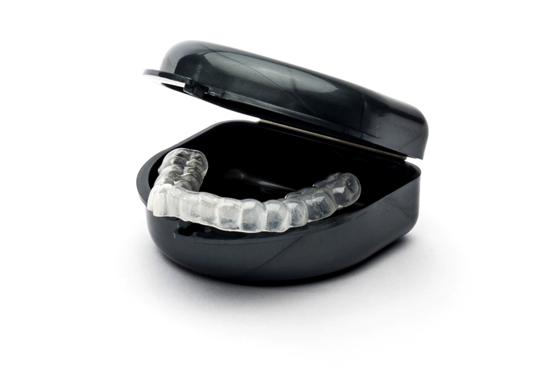Night Guards for Teeth Grinding & Clenching
Many individuals grind or clench their teeth while asleep and are not even aware they are doing so.
The strong vertical forces of grinding causes muscle pain around the cheeks and jaw and can lead to chipped or flat teeth, which may become sensitive due to excessive wear, and can also cause your gums to recede. For that, you may need to wear a night-guard.
A night-guard is a protective mouthpiece, custom fitted to your mouth that helps protect your teeth, gums, and jaws from the damaging effects of bruxism. It prevents the destruction of your teeth by preventing them from grinding together. They can also reduce any grinding noises you make at night.
It acts like a tough protective barrier between the upper and lower teeth during sleep to prevent contact, and reduce further damage and injury to the teeth, arches, lips, and gums.
A night guard helps to even out the pressure across your jaw by providing a layer of cushioning between the upper and lower teeth, as well as protects and supports the jaw muscles from this extreme tension.
It works simply by discouraging the bite, and you will find yourself finally freed from nagging jaw and facial pain.
A night guard is generally a soft, thin, non-bulky, comfortable appliance which is usually made of bendy rubber or plastic. It fits between the upper and lower sets of teeth to keep them from touching.

A night guard helps protect your teeth and prevent long-term, permanent damage in your sleep, due to grinding or clenching your teeth, which is hazardous to your long-term dental health.
The night guard will not cause you to clinch the teeth any less, but it will protect the teeth it covers.
Frequently Asked Questions
How to Stop Someone from Grinding his Teeth at Night?
What Does a Night Guard Do?
Can You Sleep with a Night Guard?
How Do I Know if I am Grinding My Teeth?
Most people who grind their teeth are not aware of it. It usually gets detected during a dental check up or the partner makes them aware having observing or heard the grinding when they sleep. Dentists look for signs of grinding by detecting tooth wear and receding gum lines.
Common symptoms of teeth grinding include:
- Headaches
- Neck Pain
- Dental Pain/Jaw pain
- Tooth Sensitivity
- Tooth Fractures
- Gum Recession
Which Night Guard to Choose, Upper/Lower/Both?
What is the Process for Getting a Custom Night Guard?
The process for getting a night guard is simple and completely painless. The dentist makes an impression of your teeth. The impression is used for creating the mould that the lab uses to fabricate your night guard out of durable plastic. The dentist will then check the guard to ensure that it fits properly. You have to wear the guard before going to bed.
It is always best to get a customized night guard rather than wearing an over-the-counter available guard, as the shape and size of every individual’s teeth is different and such guards do not fit properly.





























































